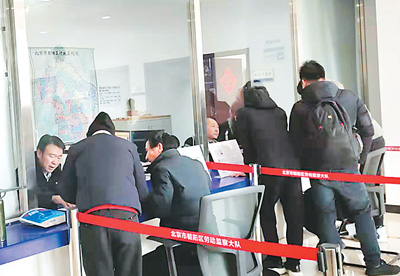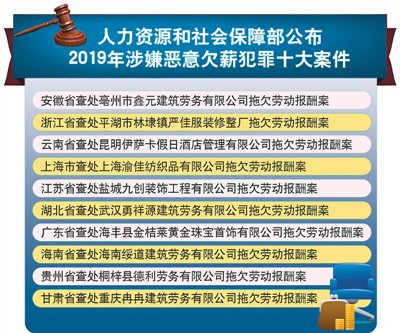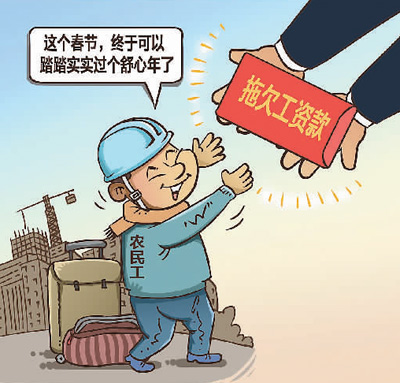The relevant departments frequently punch! In the new year, let migrant workers no longer "worry about wages"

On December 25, 2019, the staff of the labor security supervision team in Chaoyang District, Beijing (first from left, fourth from left) received complaints from representatives of migrant workers who were owed wages. Photo by Sun Rongzhen

In August, 2019, the inspector of labor security supervision team in Chaoyang District, Beijing successfully paid wages for more than 10 migrant workers, and representatives of migrant workers sent banners to show their gratitude. Photo courtesy of respondents

Xinhua news agency

Anxin New Year Guo Dexin made by Xinhua News Agency
General Secretary of the Supreme Leader stressed: "The people’s yearning for a better life is our goal." Near the end of the year, migrant workers who have worked hard in the city for a year, their greatest wish is to return home with thick wallets and bulging bags to reunite with their families.
At present, the total number of migrant workers in China exceeds 288 million. In order to safeguard their legitimate rights and interests, the party and the government have continuously stepped up efforts to deal with the problem of wage arrears for migrant workers. From November 15, 2019 to the Spring Festival in 2020, the campaign to eradicate wage arrears in winter is being carried out nationwide. It is everyone’s earnest expectation this winter to give a satisfactory result to the migrant workers who are owed wages.
Report site
"Don’t sign the contract, don’t do it!"
"Some of our workers have bought tickets to go home, and they are still dragging their feet and not giving money! We can only come to the government! "
On December 25, 2019, there are only a few days left before the arrival of the new year. Early in the morning, in front of the No.2 business window of the labor security supervision team in Chaoyang District, Beijing, a dozen sad-looking migrant workers’ brothers were surrounded and angrily told the staff about their recent unpaid wages. Everyone was talking and getting louder and louder, and the quiet business hall "exploded" and became noisy.
"People don’t worry. Leave one or two people to talk at the window and let me know the situation first. There are chairs over there, and everyone else can have a rest and have a drink. " In the window, the staff in blue uniforms leaned forward and said calmly, and the tense atmosphere eased a little.
Some people turned around and sat down in the back row, others just stepped back, still frowning, hands on their chests, and stood watching with their heads stretched out. This kind of salary-seeking scene is worrying.
Zhan Caicheng’s hometown is Bazhong, Sichuan, and he has been working in Beijing for more than ten years. He is doing dangerous work at high altitude, that is, "Spider Man". This year is the first time that he has encountered the problem of unpaid wages: "These workers all followed me to work, and as a result, more than 30 people didn’t get paid."
"What we are doing is the lighting project of a street in Chaoyang District. Now the project has been completed for more than three months, and we haven’t got the money yet. The eyes are going to celebrate the New Year, and the streets are bright, but what can we do? "
The day before the labor security supervision team in Chaoyang District complained, Zhan Caicheng and his workers went to the neighborhood office where the project was located to seek mediation. It turned out that they always thought they were working for Company A, which contracted the project, but in fact Company A had contracted the labor service to Company B, and Company B hired Zhan Caicheng and others through the contractor. Now Company A and Company B are kicking each other’s balls, and no one wants to take responsibility. No way, Zhan Caicheng and his workers found the Chaoyang District Labor Security Supervision Team.
Sitting stiffly in front of the service window, Zhan Caicheng has been holding a thick copy of the ID cards of his workmates.
"Who did you sign the employment contract with?" The staff asked for details.
"I knew the contractor before, and he introduced us. I thought that they were all acquaintances, and I didn’t even think that the contract was not a contract. " War is the only way to success. This is equivalent to the fact that the workers don’t have any vouchers in their hands now. What should we do?
"Well, you give me the phone number of a contact person in Company B first, and I will communicate with them to see if they admit that you are working for him now." The staff said.
After more than 10 minutes, the staff returned to the service hall, and the anxious workers shouted and surrounded him. The staff told everyone: "I called just now, and Yang Zong, the person in charge of Company B, answered the phone. I explained the situation, and they admitted the employment relationship and that the salary was not paid in place. Now they have proposed to pay 40,000 yuan in a few days. " The workers finally got a smile on their tight faces.
Although Company B verbally promised to pay part of the money under the pressure of the monitoring team, it has not been implemented after all. The staff suggested that Zhan Caicheng and his workmates should find the contractor who directly contacted them to write an iou first. "Write clearly how many people and how much money you owe, and you’d better have a voucher in your hand." Then he gave Zhan Cai several forms, telling him how to fill them out one by one. "If Company B fails to make the payment on time, you can come and file a case after filling out the form." Finally, I told everyone: "Don’t take all the jobs in the future. Remember, don’t do the work without signing the contract! "
"In the construction market ‘ Fellow villagers bring fellow villagers ’ The phenomenon still exists in large numbers, and many migrant workers have not realized that signing a contract is a legal protection for themselves. " Liu Shiguang, captain of the labor security supervision team in Chaoyang District, said that in handling such cases, the staff must first obtain evidence: who contracted the project to whom, who found the workers, how many workers participated in the construction, and who can prove it. After smoothing and confirming the layers of the relationship chain, most migrant workers can get their wages back.
A month ago, Lao Qiu, a migrant worker in his 60s, just got back his unpaid wages with the help of relevant departments.
Similarly, I believed in the relationship of "fellow villagers", and Lao Qiu and more than 10 workers did not get the final payment of wages for one year. "When the salary was paid that year, the boss said that the balance of the project payment had not yet arrived, and the salary could only be paid first, and the rest would be given after the year. I think the boss and we are both from the same place, and we should be considerate of each other. It should be no big problem to slow down. " As a result, there were some problems in the operation of the boss’s company, which led to Laoqiu’s delay in returning the remaining wages. In addition, there was no physical evidence such as debt between the employers and employees, and Laoqiu had to embark on the road of rushing to ask for salary. "I came to the company from my hometown for a ticket of more than 50 yuan, and I got more than 100 yuan back and forth. Three or four times a year ago. The boss owes me less than 10 thousand yuan in total, so why can’t he give it to me happily? "
After self-communication failed, on November 27, 2019, Lao Qiu finally entered the labor security supervision department to make a complaint. On December 2, the bosses of the enterprises involved were interviewed and communicated face to face with the migrant workers who were owed wages. On the afternoon of December 16th, the boss finally paid the full salary for Laoqiu and them at the mediation room. Excited Laoqiu held the staff’s hand tightly and said, "I’m finally coming back after dragging my salary for more than a year!" Thanks to the government! "
Pay front line
"I won’t let you go home empty-handed for the New Year."
Han Zhengwu, the head of the second group of Chaoyang District Labor Security Supervision Team, has been working in the team for 11 years. In his view, "sense of responsibility" is the first prerequisite for doing a good job of helping migrant workers to ask for wages. "We often go to some unexpected scenes and the situation is critical. In this case, communication skills are the most important. At this time, anything that may stimulate emotions must not be said. Once the trouble breaks out, the later work will be very difficult. What you say at the scene must stand in the complainant’s position and really consider for them. We must truly understand the inner grievances of migrant workers who are owed wages and try our best to help them resolve their grievances. "
On one occasion, Han Zhengwu and his colleagues received a task, and a group of migrant workers who were owed wages gathered at the project site, and there were more and more people on the scene. How to appease everyone?
Surrounded by workers three floors inside and three floors outside, Han Zhengwu said with a trumpet, "We are here to help you solve the difficulties on behalf of the government. What happened to everyone? Tell them one by one. I have a law enforcement instrument with me. If I can’t remember it at the scene, the law enforcement instrument can also record it. I will definitely check them one by one when I go back, in order to give you a satisfactory answer. "
Han Zhengwu told reporters: "At that time, we must give everyone an outlet to let the workers talk about the difficulties they encountered and what they didn’t have a chance to say at ordinary times. Listening to their demands will also help us understand the real situation from all angles. "
A true heart is easy to be perceived. On that day, when Han Zhengwu and his colleagues evacuated from the scene, migrant workers stood on the roadside and clapped spontaneously. "I was relieved at that moment." Han Zhengwu said.
There are many such stories in the team. Some supervisors sincerely comforted the migrant workers’ brothers who complained: "You came to ask for help empty-handed, and I will definitely not let you go home empty-handed for the New Year." Some words moved the angry migrant workers into tears.
Some migrant workers are worried that it will take too long to handle the case after the complaint is reported. Han Zhengwu and his colleagues will work overtime to try to complete the investigation as soon as possible. "Although the regulations require the monitoring team to handle the complaint within 60 days after receiving the report, in fact, the average case can be settled in 20 days at most."
In addition to those enterprises that maliciously default on the wages of migrant workers, some enterprises do have their own difficulties, such as temporary cash flow problems or risks in their development. This needs to be distinguished in specific cases, and the rights and interests of both enterprises and migrant workers should be balanced, and enterprises should not be killed with one stick.
"While paying wages for migrant workers, we should also popularize legal knowledge to business owners and urge enterprises to operate legally." According to Han Zhengwu, if it is confirmed that the enterprise is not maliciously defaulting on wages, it is necessary to make clear the bottom line while being considerate. "Like some arrears cases involving a large number of people, enterprises have to raise and advance millions of yuan in salary, which can not be put in place in a day or two. We must also consider these actual situations in our work."
In Han Zhengwu’s impression, there was a case of unpaid wages that received complaints more than one year after the completion of the project, and it was the only case that took two months to investigate. "On the day of closing the case, in the big conference room of our team, the enterprise that defaulted on wages gave money to the workers on the spot. People stood in a room full of people. After receiving the money and signing the words, the workers smiled on their faces. At that moment, I felt that although the labor inspection work was full of challenges, it was particularly meaningful. "
Effective measures
The relevant departments frequently punch.
Illegal subcontracting and layer-by-layer subcontracting lead to chaotic employment order and long interest chain, which is a key point to control the problem of wage arrears. No matter which link in this chain goes wrong, it is migrant workers who will eventually suffer. A typical case is what happened to the workers like Cai Cheng after the war.
Wang Cheng, director of the Labor and Social Security Supervision Bureau of the Ministry of Human Resources and Social Security, believes that in order to eradicate wage arrears, especially in the field of engineering construction, we must persist in working hard at ordinary times, persist in daily work, grasp the problem of wage arrears early, increase the intensity of daily supervision and law enforcement, pay attention to the construction of enterprise wage payment system, and implement the main responsibility of enterprise wage payment; Grasp the hidden dangers of unpaid wages and the handling of cases, solve contradictions in the bud, prevent accumulation of accumulated cases, and reduce the situation that migrant workers’ brothers are anxious to go home at the end of the year, and the more they need money, the less they can get money.
In order to solve this difficult problem, the national level is constantly weaving a network to protect the legitimate rights and interests of migrant workers.
Since the General Office of the State Council issued the Opinions on Comprehensively Governing the Wage Arrears of Migrant Workers in 2016, the implementation of the territorial supervision responsibility for ensuring the wage payment of migrant workers has been effectively promoted.
In September 2017, the Ministry of Human Resources and Social Security issued the Interim Measures for the Administration of the Blacklist of Wages Arrears for Migrant Workers, established a blacklist system for wage arrears for migrant workers, and blacklisted employers who violated the law and lost trust in wage arrears.
Beginning in 2018, the blacklist of wages owed to migrant workers was announced one after another. In the first half of 2019, the Ministry of Human Resources and Social Security announced a total of 180 blacklists of three batches of wages owed to migrant workers, which were included in the national credit information sharing platform and implemented joint punishment according to law. Enterprises on this blacklist will be restricted from participating in project bidding and credit financing, and their legal representatives will also be restricted from high consumption.
More serious malicious unpaid wages may violate the criminal law. In 2011, the criminal law amendment formally criminalized "malicious unpaid wages" and "refusing to pay workers’ remuneration" was included in the scope of criminal law adjustment. From 2011 to September 2019, the human and social departments transferred more than 26,000 cases suspected of refusing to pay labor remuneration to public security organs. People’s courts at all levels sentenced 7,674 defendants to criminal detention or fixed-term imprisonment, and 116 people were sentenced to fixed-term imprisonment of more than three years.
In September, 2019, the the State Council Leading Group for Radical Eradication of Wage Arrears for Migrant Workers reported the assessment of the payment of wages for migrant workers by provincial governments in 2018, among which the heads of provincial governments in three regions were interviewed.
In the past month since the 2019 campaign to eradicate wage arrears in winter, a total of 6,654 cases of wage arrears have been handled in various places, and a total of 1.075 billion yuan has been paid to 81,000 migrant workers.
Radical wage arrears
There will be basically no arrears in 2020.
In 2013, General Secretary of the Supreme Leader stressed during his inspection in Gansu that building a well-off society in an all-round way is inseparable from the hard work and dedication of migrant workers. The whole society should care for migrant workers, resolutely put an end to the phenomenon of wage arrears and deduction of migrant workers, and effectively protect their legitimate rights and interests.
On December 23, 2019, Premier Li Keqiang inspected a construction site in Chengdu, Sichuan, saying that migrant workers worked overtime day and night, earning hard money. It is unconscionable to delay or even maliciously delay their wages, which must be resolutely eradicated.
In order to eradicate the problem of wage arrears for migrant workers, on December 4, 2019, the the State Council executive meeting deliberated and passed the Regulations on the Protection of Wages Payment for Migrant Workers (Draft), which further clarified the employer’s main responsibility, the government’s territorial responsibility and the departmental supervision responsibility, and proposed that in the case that the employer, the construction unit and the contractor contract out the work tasks and projects to individuals or units that do not have legal business qualifications, once the wages of migrant workers are in arrears, the contracting unit shall bear the responsibility of paying off the wages owed to migrant workers according to law.
In Han Zhengwu’s view, "this clause in the draft provides a starting point for our grassroots case handlers, and it will be more effective to deal with the wage arrears of migrant workers caused by such subcontracting."
The importance of multi-sectoral joint law enforcement has become increasingly prominent. Ministry of Human Resources and Social Security, the Supreme People’s Court, the Supreme People’s Procuratorate and the Ministry of Public Security, as members of the State Council’s leading group for eradicating wage arrears for migrant workers, actively build a "through train" for labor security supervision, law enforcement and criminal justice.
In addition, with the development of society, we should not only pay attention to migrant workers employed in traditional industries, but also pay attention to migrant workers employed in new formats in time. Nowadays, among takeaway brothers and couriers, there are also phenomena such as outsourcing and temporary employment, and the hidden dangers of wage arrears need the attention of relevant departments as soon as possible.
According to the monitoring data of the National Bureau of Statistics, the wage arrears rate of migrant workers was 4% in 2008, about 0.6% in 2018, and the goal in 2020 is to achieve basically no arrears.
"With a sound system construction, clear responsibility implementation and the attention of government departments at all levels, we grassroots staff are very confident!" Han Zhengwu said.